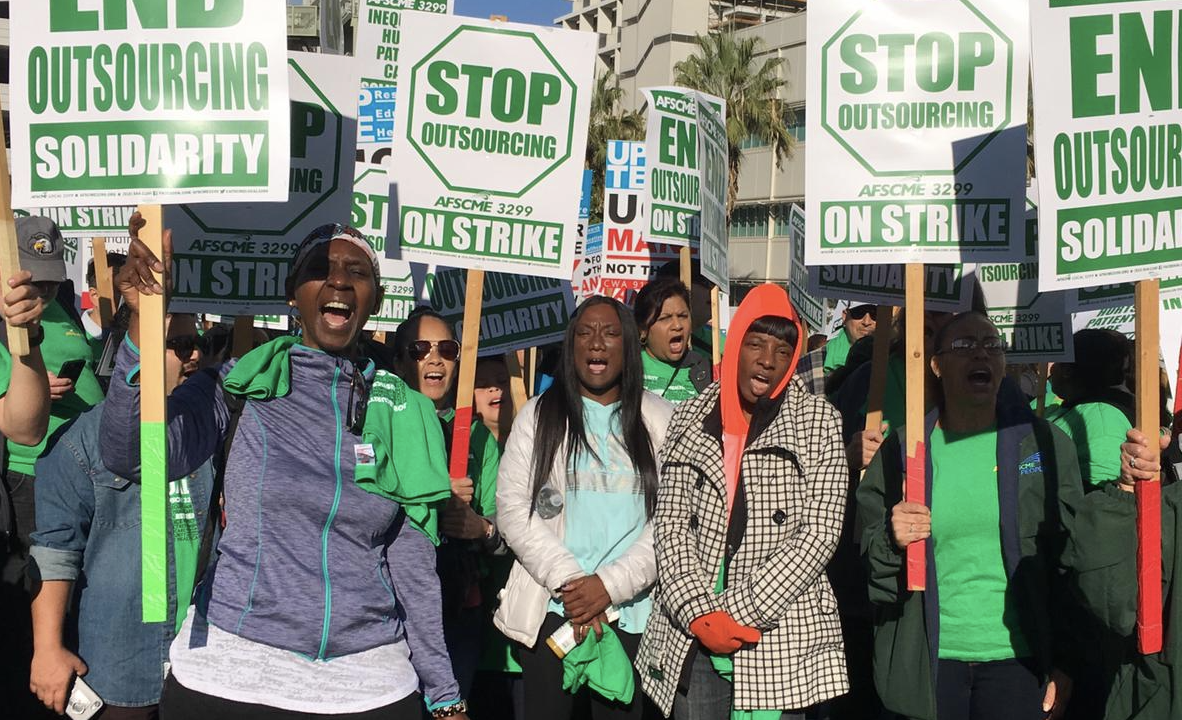We’ve faced unprecedented challenges for workers of color for years now. While the trend extends far beyond Trump’s time in office, it is certainly exacerbated by an administration that cozies up to the financial sector and blatant racists alike. It’s safe to say that the power of right-wing, anti-union forces is at peak levels. It should come as no surprise that the focus of many of these anti-union attacks are Black and Brown workers. Historically, Black and Brown workers have always been an initial target for right-wing forces – a trend that continues into this moment. And now, just when we thought things couldn’t get any worse for at-risk workers, we are headed towards a massive recession which we know will hit them and their communities harder than anyone.
Now is as important a time as ever to make sure our efforts to unionize employees happen alongside broader fights for racial justice. Unions, which have been a major force for economic justice for people of color in the past 50 years, have been decimated to historically low levels. With record unemployment set to be the norm, Unions could see their memberships decimated even more.
It’s time for traditional labor organizations, newer worker organizations and the broader racial justice movement to link together to bring in a radically new economic and social order. This task is a difficult one and will be even more challenging in this moment. But recent history has shown that a key strategy to achieve this new reality is through using the tool of union bargaining, an approach that is now commonly known as Bargaining for Common Good. Consider a recent example of organizing at the University of California.
AFSCME 3299 led a transformative campaign that put racial justice front and center. The union came into the campaign with the goal of ending the outsourcing of its members’ jobs. The campaign had many highlights – including striking six times and threatening a seventh, actions and reports that exposed UC’s failed Wall Street gamble on hedge funds which squandered over $1 billion of pension and endowment money in fees, a multi-year legislative campaign culminating in the first ever Constitutional Amendment to ban outsourcing, and a “speakers boycott” that culminated in the DNC moving its December 2019 debate from UCLA. But even more important than those core bread and butter wins is how they were won. AFSCME 3299 for years has invested in relationships with other organizations – whether they be student organizations on campus, other unions, or racial justice groups on the ground. The union has an internal commitment to racial justice that goes beyond rhetoric and actually drives their campaign work.
This particular campaign was grounded in research that found racial and gender disparities in AFSCME members’ wage rates, largely due to the concentration of Black and Latinx workers, especially women, in lower-paying titles, and a steady decline in Black employment over the course of two decades. These facts dovetail with other racial justice realities throughout the state, including attacks on Immigrant communities and a lack of employment opportunities for the formerly incarcerated. By working with the community and their rank and file workforce, Local 3299 was able to incorporate these demands into their contract fight – something that would be unthinkable under normal union bargaining. After a 3-year campaign steeped deeply in Bargaining for the Common Good, UC executives finally relented to the Union’s core demands, including a general prohibition against outsourcing; additional immigrant rights protections; a commitment to advance hiring and training opportunities for underrepresented communities, including formerly incarcerated workers; no cuts to members’ retirement security; and a minimum wage of $20 per hour by 2024. This landmark contract will have ripple effects throughout California for years to come.
Local 3299’s targeting of Wall Street and other corporations was intentional. Wall Street doesn’t hesitate to profit off of and perpetuate disinvestment in communities of color, and too often we forget to look up the food chain to see that at the other end of community crises there are rich bankers and billionaires lining their pockets. Campaigns like the one at the University of California that involve direct actions targeting banks, hedge funds, corporations and billionaires are effective and essential to get real wins for our communities.
This kind of organizing can be hard. In order to isolate workers from their broader communities, the other side has done a terrific job of narrowly defining the scope of bargaining as wages and benefits. In many states, labor laws prohibit public sector workers from bargaining over issues that concern the welfare of the broader community or the quality of the services they provide.
The theory of “Bargaining for the Common Good” seeks to challenge this status quo. As articulated by Joseph McCartin of Georgetown University’s Kalmanovitz Initiative for Labor and the Working Poor, Bargaining for the Common Good has three main tenets:
1) Transcending the bargaining frameworks written in law and rejecting them as tools for the corporate elite to remain in power;
2) Crafting demands between local community groups and unions at the same time and in close coordination with each other from the very beginning; and
3) Embracing collective direct action as key to the success of organizing campaigns.
These may seem like simple ideas, but they stand in complete opposition to the way the corporate elite expects union bargaining to be done. Therein lies their power.
While the rank and file membership and leadership of Local 3299 is impressive, any union can do this. In fact, it is exciting to imagine the potential bargaining demands major unions could undertake alongside others for racial justice issues. For example, city and state workers could demand progressive taxation measures that raise funds from corporate actors to resource schools and services in black communities; teachers could demand school districts enact restorative justice policies to stem the school-to-prison pipeline; hospital workers could bargain for targeted health care access programs in communities of color; retail workers could demand that their employers “ban the box” and let the formerly incarcerated work. The list is almost infinite.
The current moment makes this work all the more essential. Will we see real, long-term, systemic investments that target the differential impacts on communities of color, or more of the same with giveaways to corporations and the wealthy elite that will perpetuate structural racism? Bargaining and organizing for racial justice is a radical idea and will not be easily won. It will require concerted direct action targeting the real decision makers in both the public and private sectors that have a vested interest in keeping racial inequities in place.
A Call to Action in This Moment


